Trikafta is made up of 3 medicines; elexacaftor, tezacaftor and ivacaftor. These are referred to as transmembrane conductance regulator (CFTR) modulator therapies.
For people with cystic fibrosis, CFTR modulator therapies are designed to correct the action of the protein made by the CFTR gene. The CFTR protein regulates the proper flow of water and chloride in and out of cells lining the lungs and other organs. In people with CF, mutations in the CFTR gene result in either a defective protein being produced or no protein at all. This leads to the build up of thick, sticky mucus, which can lead to infections in the lungs and damage to the pancreas. It can also lead to problems in other parts of the body.
If you have cystic fibrosis caused by a specific mutation in the CFTR gene, Trikafta can help your breathing by improving your lung function. You may also notice that you don't get ill as often, or that it's easier to maintain a healthy weight. Because different mutations cause different defects in the protein, Trikafta is only useful for people with specific mutations.
We're aware of a problem when trying to use Zero Data to link to Healthify. Zero Data is managed by Health NZ and we are working with them to get this fixed.
Trikafta
Sounds like 'Try-kahf-tar'
Key points about Trikafta
- Trikafta is used for some people with cystic fibrosis.
- Trikafta is made up of 3 medicines; elexacaftor, tezacaftor and ivacaftor.
- These are referred to as transmembrane conductance regulator (CFTR) modulator therapies.
- Find out how to take it safely and possible side effects.

Trikafta is made up of 2 types of tablets, taken in the morning and evening:
- Morning dose: the tablet contains elexacaftor, tezacaftor and ivacaftor
- Evening dose: the tablet contains just ivacaftor.
Your doctor will tell you how much Trikafta you need to take each day. This may depend on your condition, other illnesses you may have and whether or not you are taking other medicines.
- The usual adult dose is 2 tablets of 100 mg elexacaftor/50 mg tezacaftor/75 mg ivacaftor in the morning and 1 tablet of ivacaftor 150 mg in the evening.
- Some people may need lower doses.

- Timing: Take Trikafta every day, in the morning and evening, about 12 hours apart. Swallow the tablets whole. Don't break, chew, or dissolve the tablets.
- Food and drink: Take the morning and evening tablets with a meal or snack that contains fat to help your body absorb the medicine. Examples of suitable foods are those prepared with butter or oils or containing eggs, cheese, nuts, chocolate, whole-milk dairy products, meats, oily fish, avocado or soy-based products (tofu). Avoid food or juice containing grapefruit or Seville oranges, as it can increase your risk of side effects.
- Missed dose:
- If it is less than 6 hours since your missed morning or evening dose, take the missed dose as soon as possible and then carry on as usual.
- If it is more than 6 hours since your missed morning dose, take the missed dose as soon as possible and don’t take your evening dose, then carry on as usual.
- If it is more than 6 hours since your missed evening dose, do not take it, take your next morning dose as scheduled, and carry on as usual.
Here are some things to know when you're taking Trikafta. Other things may be important as well, so ask your healthcare provider what you should know about.
- Trikafta can interact with other medicines. Tell your doctor or pharmacist about all medicines you are taking including over the counter medicines and herbal supplements or vitamins.
- Tell your doctor if you are pregnant or intend to become pregnant.
- Remind any doctor, dentist, or pharmacist you visit that you are taking Trikafta.
Like all medicines, Trikafta can cause side effects, although not everyone gets them.
| Side effects | What should I do? |
|---|---|
|
|
|
|
|
|
| Read more about medicines and side effects and reporting a reaction you think might be a side effect. | |
Trikafta(external link) Medsafe Consumer Information Sheet
Resources
5 questions to ask about your medications(external link) Health Quality and Safety Commission, NZ, 2019 English(external link), te reo Māori(external link)
References
- Elexacaftor + tezacaftor + ivacaftor(external link) New Zealand Formulary
Brochures

Medicines and side effects
Healthify He Puna Waiora, NZ, 2024

Health Quality and Safety Commission, NZ, 2019 English, te reo Māori
Credits: Sandra Ponen, Pharmacist, Healthify He Puna Waiora. Healthify is brought to you by Health Navigator Charitable Trust.
Reviewed by: Angela Lambie, Pharmacist, Auckland
Last reviewed:
Page last updated:





